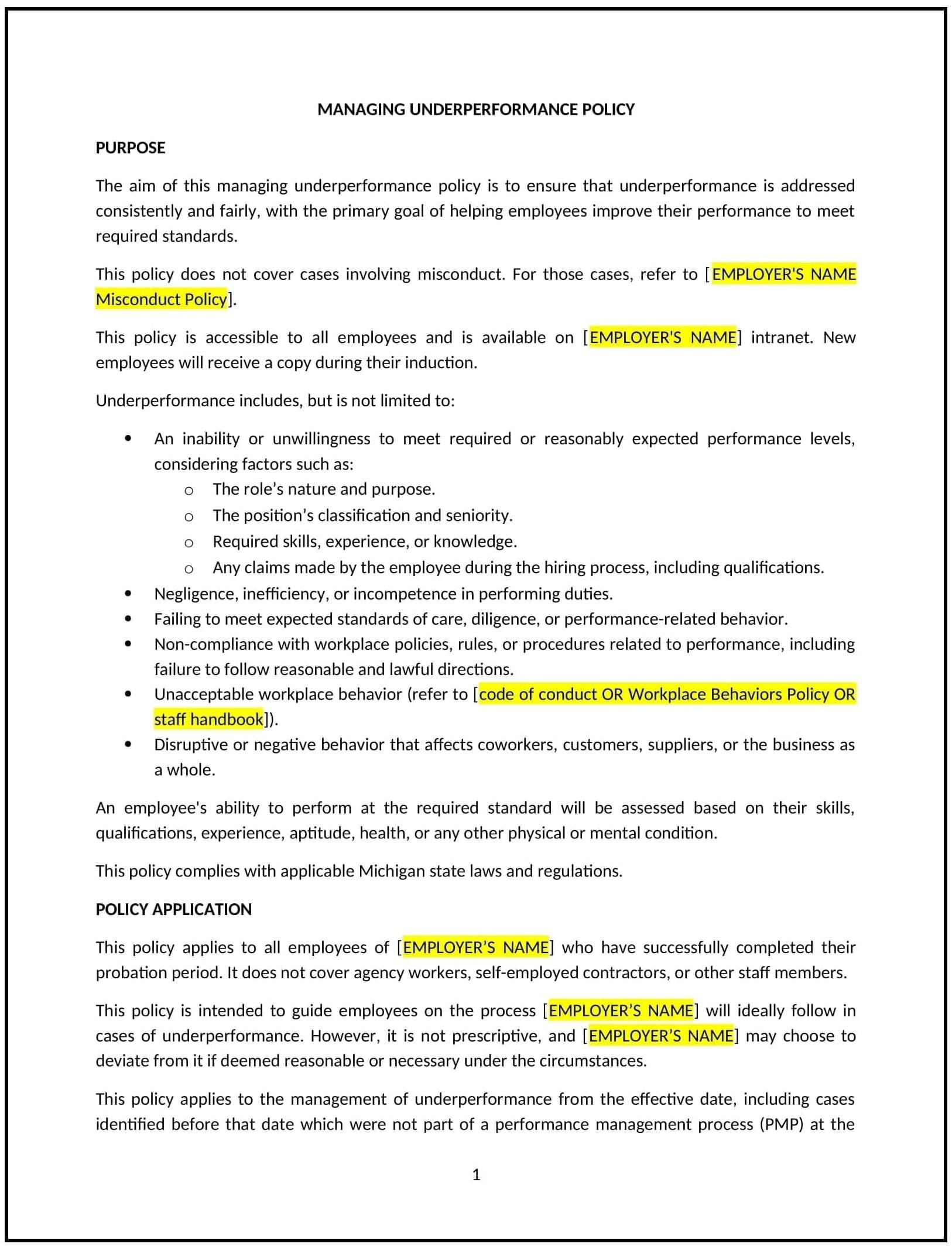Managing underperformance policy (Michigan): Free template
Got contracts to review? While you're here for policies, let Cobrief make contract review effortless—start your free review now.

Customize this template for free
Managing underperformance policy (Michigan)
A managing underperformance policy provides Michigan businesses with a structured approach for addressing employee underperformance. This policy outlines how businesses should identify performance issues, provide feedback and support, and take corrective actions to improve employee performance. The goal is to help employees meet expectations while maintaining a fair and transparent process for addressing performance challenges.
By implementing this policy, businesses can foster a culture of continuous improvement, support employee development, and minimize the risk of poor performance impacting business operations.
How to use this managing underperformance policy (Michigan)
- Define performance expectations: Clearly outline the key performance indicators (KPIs) or expectations for each role within the business, including the skills, behaviors, and outcomes expected from employees.
- Identify underperformance: Specify the criteria for identifying underperformance, including factors like missed deadlines, low productivity, poor quality of work, or failure to meet specific goals.
- Provide feedback: Establish procedures for providing regular feedback to employees on their performance, including one-on-one meetings, performance reviews, and informal check-ins to discuss progress and areas for improvement.
- Offer support and development: Include steps to support employees in improving their performance, such as offering additional training, mentoring, or resources. The policy should encourage businesses to provide constructive feedback and development opportunities.
- Develop performance improvement plans (PIPs): If underperformance persists, outline how to create a formal performance improvement plan (PIP) that includes clear, measurable goals, timelines for improvement, and regular follow-up meetings to track progress.
- Address ongoing underperformance: Specify the steps to take if performance does not improve after a PIP, including possible disciplinary actions such as warnings, demotion, or termination.
- Document everything: Require that all steps taken during the underperformance management process be documented, including feedback sessions, support provided, and any actions taken. This documentation helps ensure consistency and protects the business legally.
- Review the policy regularly: Periodically review the policy to ensure it remains effective and aligned with changes in business needs, industry standards, or Michigan state laws.
Benefits of using this managing underperformance policy (Michigan)
This policy provides several key benefits for Michigan businesses:
- Provides a clear process: A structured approach to managing underperformance ensures that all employees are treated fairly and that businesses can address performance issues consistently and transparently.
- Supports employee development: By identifying performance issues early and providing opportunities for improvement, businesses can help employees grow professionally and reach their full potential.
- Reduces legal risks: A clear policy for managing underperformance reduces the risk of legal challenges related to performance issues, such as wrongful termination or discrimination claims.
- Improves team productivity: Addressing underperformance promptly helps maintain a productive work environment, ensuring that poor performance does not affect the overall success of the team or business.
- Enhances employee engagement: Employees who receive regular feedback and support to improve their performance are more likely to feel valued and motivated, leading to higher morale and engagement.
Tips for using this managing underperformance policy (Michigan)
- Communicate the policy clearly: Ensure that employees understand the managing underperformance policy by including it in the employee handbook, during onboarding, and in regular training sessions on performance expectations.
- Provide timely feedback: Regularly monitor employee performance and provide feedback in a timely manner to address any issues before they become larger problems.
- Foster an open environment: Encourage employees to openly discuss their challenges and seek support if needed. An open and supportive work environment makes it easier to address underperformance proactively.
- Involve managers in the process: Ensure that managers are equipped to handle performance discussions, create performance improvement plans, and provide the necessary support for employees.
- Review and update the policy: Regularly review the policy to ensure it reflects the latest best practices, Michigan laws, and any changes in the business’s objectives or performance management processes.